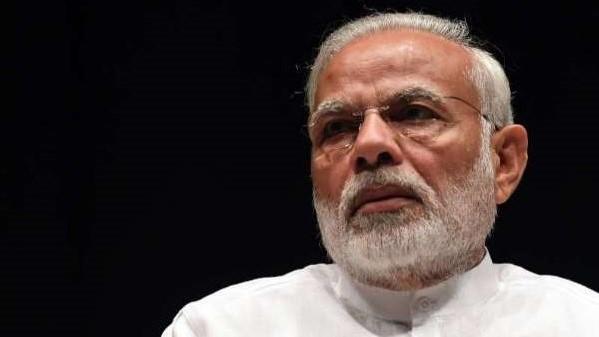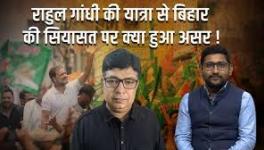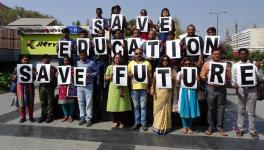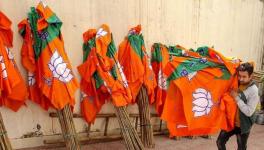Why Prime Minister Modi’s New Year Interview Is A Flop Show

Image Courtesy: dailyhunt
Prime Minister Narendra Modi has a good sense of timing. He showed this again by giving an interview on the first day of 2019. He probably expected the interview to set the agenda in an election year, with the Opposition and his critics constantly responding to it. But because he had nothing new to say, Modi’s interview ended up being like Salman Khan’s latest flop film. Eventually, people get bored of the same old content.
Modi repeated his old mistake by picking ANI for the interview. He has been rightly accused in the past of opening himself up for question to ‘convenient’ journalists, and ANI is no different. The interviews he had done with ANI earlier were more of propaganda. This one, though, was not as bad. Modi had allowed the interviewer, Smita Prakash, to ask a few uncomfortable questions. But as the 90-minute interview unfolded, it became apparent that the interview was fixed. The follow-up questions disappeared and Modi’s Mann Ki Baat took over.
The most significant political development of 2018 was the state elections in Madhya Pradesh, Rajasthan and Chhattisgarh. The Bharatiya Janata Party (BJP) ended up losing all of these, in spite of winning 62 of the 65 seats in these three states during the 2014 Lok Sabha elections.
A good captain takes responsibility when things go south. But Modi defended BJP’s performance in Madhya Pradesh and Rajasthan. He did not analyse why people of those states rejected the incumbent. If BJP’s victories are credited to Modi and BJP president Amit Shah, why shouldn’t they own up the debacles? The interviewer didn’t ask this question. Probably, she feared Modi would walk out like he did with Karan Thapar.
That wasn’t the only time Modi circumvented the question. To be fair, he was never known to speak truth. Modi and BJP incessantly campaigned on the plank of ‘Congress-Mukt Bharat’. After having realised that this isn’t possible, he has now said his fight is against the culture that Congress represents. There is no need to deny Congress’ dynasty and corruption-ridden politics, but the BJP has not proved itself to be different in the last four years.
On top of it, Modi audaciously defended demonetisation, and refused to accept the drawbacks with GST (Goods and Services Tax), in spite of the fact that most of the credible economists across the world have pointed out the foolishness behind the idea of demonetisation. This shock cost 120 innocent lives. But there was no remorse from the leader of the country. Both the decisions hurt traders and businessmen, who are Modi’s voter. Instead of empathising with their gripe, Modi, a bit like former Prime Minister Rajiv Gandhi or R.R Patil (former Maharashtra Home Minister), said when a train changes its track, the speed changes!
The Prime Minister had nothing substantial to say on the biggest issues that India is grappling with: rural distress and unemployment. He played to the gallery of the urban middle class by saying farmers should be empowered instead of enforcing loan waivers. He denigrated the loan waivers enforced by the Congress, describing it as a ‘lollipop’, but conveniently ignored the loan waivers enforced by his own governments in Maharashtra and Uttar Pradesh.
Even some farm leaders have said the loan waivers aren't going to solve the agrarian crisis, but Modi had no answers to why he hasn't been able to fulfil the promises he made to farmers in the run-up to 2014 general elections. He held ‘chai pe charchas’ (talks over tea) with farmers but his promises of doubling farm income or providing minimum support prices 1.5 times the production cost, seem to have drowned with the tea. Farmers have consistently carried out protest marches, but the Prime Minister has not had the courage or the sensitivity to face them or have a dialogue with them.
Moving on to lynchings in the name of the cow and Hindutva, Modi addressed the issues with a one-liner, a token condemnation of the deaths. But the fact that his party and government emboldened and enabled those lynchings, remains unaddressed. Ministers in his cabinet have justified the killings and incidents, yet Modi brazenly questioned if such incidents began only after 2014. The answer is, Yes. A good 98% of such incidents have transpired after Modi assumed power. But the interviewer did not think of this obvious follow-up question. Her loyalty was more important.
Modi even managed to expose his hypocrisy on gender. He defended the shameful developments in Sabarimala by saying it is a matter of tradition, while linking Triple Talaaq to equality. The Supreme Court has had its say in both the decisions. But the Prime Minister respects one and ignores the other. He probably forgot that he is supposed to live by the Constitution and not a "Bunch of Thoughts".
The saving grace of the interview was Modi's comments on Ram Mandir, where he said the matter was sub judice and one should wait until the decision of the Supreme Court. Having said that, fringe groups have been inciting hatred in the name of Ram Mandir. So, this is a classic good cop-bad cop strategy that the BJP seems to have adopted.
When it comes to the controversial Rafale deal, Modi said the allegations were against his Cabinet, not against him personally. Which is a joke, because Congress president Rahul Gandhi has been going to town with his slogan "Chowkidar chor hai" (the watchman is a thief). That Modi changed the deal and got Anil Ambani into it, is also not a new allegation. The Prime Minister’s counter of a "clean chit" by the Supreme Court is also inaccurate. His answers only aggravated suspicions of a shady deal. This became all the more obvious when he did not attend the Lok Sabha during a debate on the Rafale deal.
It is worth researching on whether what Modi said in the interview had not been said before. His claims of development have been contested. The Ayushyaman Bharat Yojana has only managed to get 4% of the work done. Electrifying every village in India was the Congress-led United Progressive Alliance’s initiative and Modi only finished what was remaining. More than one lakh villages were electrified under Manmohan Singh’s government. Modi completed this task by electrifying the remaining 18,000 villages. And the notion that India's image rose in the world under Modi has no substantial proof, since The Economist magazine has just reported that international investments have dipped in India.
Heading into the general elections of 2019, Modi seems to be emulating former Prime Minister Indira Gandhi by saying the contest would be between people and the Mahagathbandhan (Grand Alliance). But the ploy didn't work in 1977. Modi's repeated attacks on the Gandhi family will only coax his core voters, not the fence- sitters.
However, there is one thing that stood out in the interview. Modi's body language and approach. He was absolutely on the defensive. But whether this is a genuine change triggered by the loss in three state elections or pretence of an astute politician is anybody's guess.
Get the latest reports & analysis with people's perspective on Protests, movements & deep analytical videos, discussions of the current affairs in your Telegram app. Subscribe to NewsClick's Telegram channel & get Real-Time updates on stories, as they get published on our website.
























